[China] Acceptability of fast-growing Chinese auto brands in other countries
- Release date: Jun 25, 2024
- 3644 Views
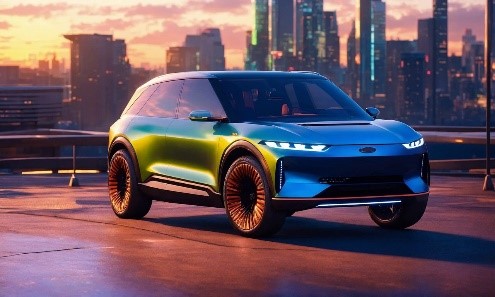
China accounts for one third of all car sales worldwide, and until recently, foreign brands such as Japanese, American and German cars were the most popular (for China), but in recent years, the proportion of Chinese local brands, known as ethnic brands, has increased rapidly, and the overseas expansion of these ethnic brands has also accelerated. In Japan, BYD, a Chinese brand, made a big splash at last year's Japan Mobility Show, and in emerging countries, it is not uncommon for several Chinese brands to be present in the same country.
While the presence of Chinese brands is increasing worldwide, there are also negative impressions associated with Chinese brands that have a short history, and it seems that we are approaching a period of transition for Chinese brands. To explore attitudes towards Chinese brands and their future potential, INTAGE conducted a questionnaire survey on Chinese car brands targeting car license holders in six major countries (Japan, the US, Germany, Thailand, Indonesia, and China).
In this article, we will consider the acceptability of Chinese brands in each country as seen in the results of the survey.

Do you want to buy a Chinese brand car?
How many people are interested in buying Chinese brands? The following table shows the results of a survey asking which country's brands would be considered when buying a car next, with multiple answers allowed. Those who said they would consider a "Chinese brand" as a target for purchase were less than 10% in developed countries such as Japan, the US, and Germany, and more than 20% in emerging countries such as Thailand and Indonesia, showing that consideration of Chinese brands such as BYD and Wuling is increasing in Southeast Asia, where they are making inroads. Although 20% may seem low, when you consider that the scores for American and German brands, which have a certain market share, are close to 30%, it seems that the presence of Chinese brands in Southeast Asia, which was once considered the sole domain of Japanese brands, is increasing considerably.
In China, around 70% of respondents expressed a preference for "Chinese brands", which is surprising as this is now on a par with the scores given by people in Japan, Germany and the US for their own national brands. In previous surveys in China, we often heard people say "I don't want to buy Chinese brands because I don't trust them", but it seems that attitudes in China are changing.
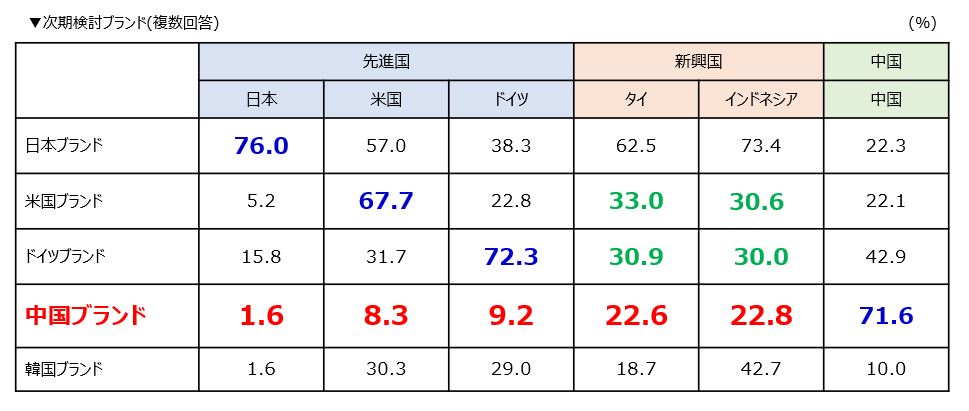
On a slightly different note, the proportion of electric vehicles (EVs) in China's car sales is high, and the figure is much higher than in the US, which has Tesla. I think many people have the image that when you think of Chinese cars, you think of EVs. Emerging EV brands such as Nio and Xpeng, as well as BYD, which is starting to become known in Japan, are highly regarded in China for their high functionality and high quality of service, and they are attracting attention from people in the automotive industry in other countries.
In this survey, we asked about the current ownership rate of EVs and the intention rate for the next model (both single answer), and by looking at the difference between the two, we were able to see how much the EV market is likely to grow in the future. The difference between the intention rate and the ownership rate, i.e. the number of people who are not currently EV owners but would like to be in the future, is higher in Thailand and Indonesia than in other countries, and when combined with the high level of consideration for Chinese brands, it is clear that Chinese brands are on the rise.
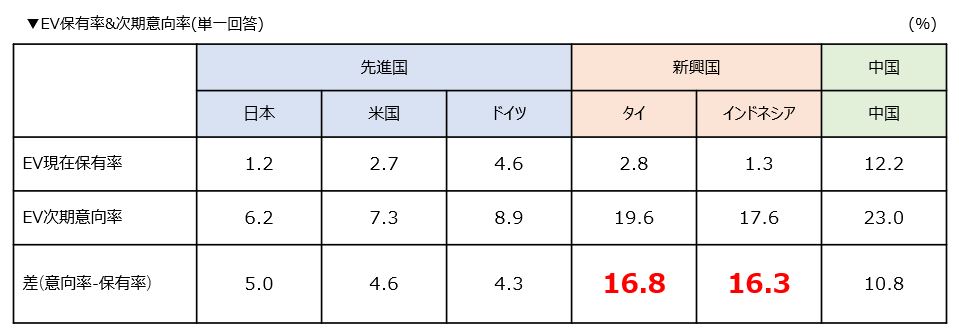
What kind of image do you have of Chinese brands?
Next, please take a look at the results for the top 5 positive images of Chinese brands by country. In most of the 5 countries excluding China, the 4 items that commonly rank in the top 5 are "innovative", "unique", "highly skilled", and "advanced", which are characteristic images of emerging brands. On the other hand, "None of the above" was selected by 80% of respondents in Japan and around 40% in the US and Germany, and the aforementioned characteristics of an emerging brand also scored relatively low. In China, the home country, the "innovative" image was high, as in other countries, and the "friendly" and "reliable" images were also high.

We also asked about negative perceptions of Chinese brands, which may still be controversial. As a result, in all five countries except China, the two top responses were "low quality" and "unreliable". Even in China, the local market, "low quality" was ranked highly. In addition, in three countries - Germany, Thailand and Indonesia - "poor user reputation" was also ranked highly.

When would you be willing to buy a Chinese brand?
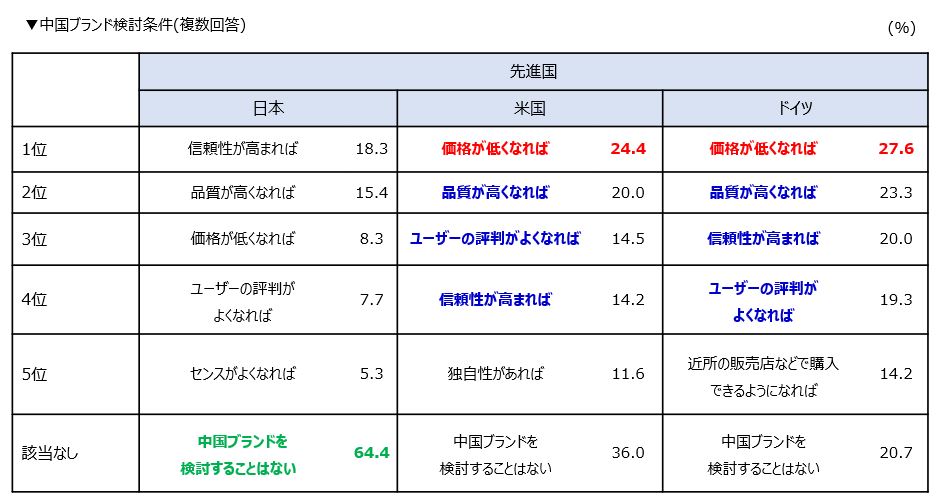
Summary
The image of Chinese car brands is one that combines both positive and negative aspects: "They are technologically advanced, but there are concerns about quality and reliability". In the emerging markets of Thailand and Indonesia, there is a high rate of intention to purchase EVs, and there is also a high level of consideration for Chinese brands, so growth can be expected. On the other hand, in the developed markets of the US and Germany, there is a strong sense of concern about issues such as price, quality and reliability, and due to the involvement of legislation and politics, it is difficult to see what the future holds. Although we have heard that the momentum of EVs has recently slowed down, the market is still expanding, although at a slower rate, so I think it is important to continue to monitor the trends of Chinese car manufacturers, who are seeing their strengths in this area.
Appendix
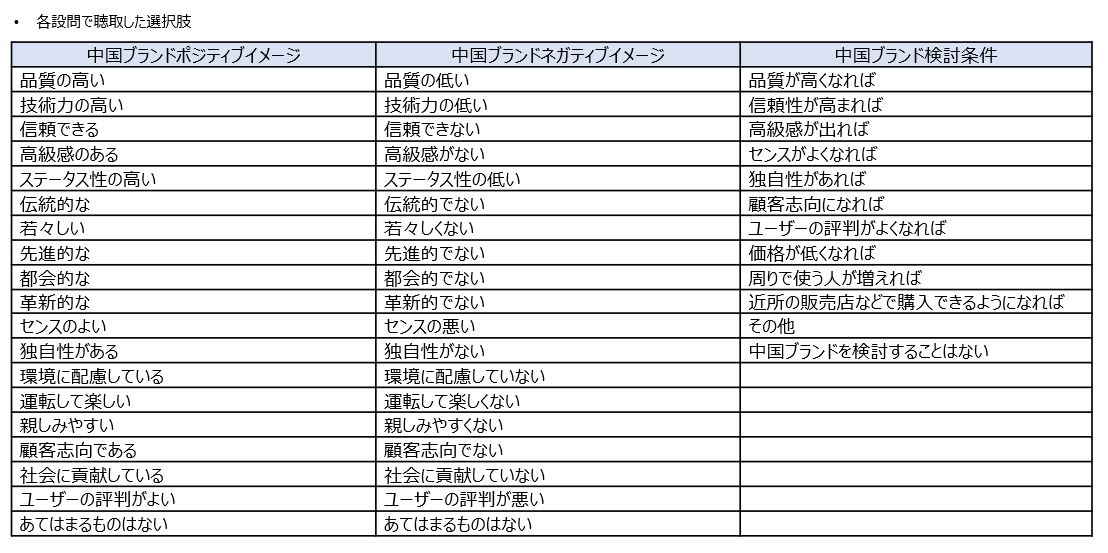
Translated with AI Translator
-

Author profile
Fumiharu Suzuki
Global researcher at INTAGE. After working as a working holiday in New Zealand and as a member of the Japan Overseas Cooperation Volunteers in Venezuela, he joined INTAGE and has been involved in global research using various methods for over 15 years. He has conducted research in over 30 countries and has gained a wealth of experience in a wide range of industries, including automobiles, food, electronics, and daily goods. He is currently working shorter hours due to childcare, and the only thing that bothers him is that he can't go on overseas business trips.
-

Editor profile
Intage Inc.
***
 Global Market Surfer
Global Market Surfer CLP
CLP